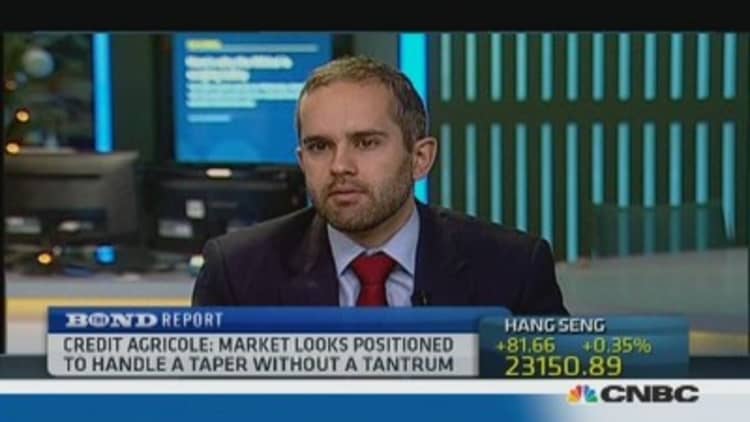Investors are still betting big on sovereign debt from struggling euro zone countries even as European banks offload their investments in an attempt to meet strict new capital rules.
Global investment firm Pimco, which manages some of the biggest bond funds in the world and has $1.97 trillion under management, has outlined its bullishness on Italian and Spanish debt in its latest quarterly outlook.
"We are overweight Italy and Spain sovereign debt in our portfolios, balancing the cyclical outlook, where we expect the ECB (European Central Bank) to maintain stability," Andrew Balls, managing director and head of European portfolio management at Pimco, said in client note on Tuesday afternoon.
"The size, liquidity and systemic importance of the Italian and Spanish markets make them our preferred source of peripheral risk."
(Read more: Why the euro zone bond rally may be ending)
Yields on benchmark government 10-year bonds from Spain and Italy - often seen as a proxy for risk in the euro zone - have calmed in recent months, dipping to around 4 percent. This is a far cry from the highs of 7 percent reached during market flare-ups in 2011-2012.
Back then, the European Central Bank helped out the euro zone's struggling lenders by launching cheap long-term loans, known as LTROs (long term refinancing operations). The banks used these cheap loans to buy government debt issued by their home countries -- even from struggling euro zone countries. This gave them a high return on the cheap cash obtained from the ECB and helped out countries' struggling to pay down their debt in the process.
But it now appears the happy times of the LTROs are coming to an end. With the ECB launching a quality review of the euro zone's banks last month, European banks are bus offloading riskier government debt to shore up their balance sheets. The Bank of Italy said in its November financial stability report that there were net disposals of securities by Italian banks in the third quarter of 2013.

'Funding pressures'
But many analysts see this approach as bearish. On top of this, other bond investors apart from euro zone banks look set to lose out as a lack of buyers in the market would lower the price and mean investors lose money.
Additionally, Valentin Marinov, head of European G10 currency strategy at Citi, pointed out in a research note this week that Italy and Spain may face mounting "funding pressures" in late 2014 due this this lack of buying from domestic banks.
(Read More: Take cover! Bond market 'hell' could be on the way)
Bill Blain, a senior fixed income broker at Mint Partners, has previously told CNBC that he believes the ECB will embark on another LTRO program in the near future. Whilst this may calm markets further, he says that European banks will fall back into their old ways and will continue purchasing government debt adding to this "doom loop" where banks and euro zone governments could potentially drag each other down in a future crisis.
"They are not sovereign bonds anymore, they are bonds issued by sovereign entities linked to a currency they don't control," he told CNBC back in November. "If things turn badly, let's say at the result of another rout in the U.S. bond markets when the taper finally begins...then we get the whole crisis reignited."
Banks to continue selling?
Pimco, in contrast, are bullish on the prospect of another LTRO and the ability for the ECB to backstop Italian and Spanish yields. Peter Chatwell, interest rate strategist at Credit Agricole Corporate and Investment Bank, agrees and concludes that the breaking of the "doom loop" wouldn't help, but wouldn't be a reason for selling these peripheral bonds.
"We've got enough evidence of good flows coming back into the periphery still that investors are looking at this as a buying opportunity," he told CNBC Wednesday.
"The data which comes from the Bank of Italy shows that Italian banks, for example, have been reducing their holdings of (Italian government bonds) over the last three months significantly. But you look at the yields, yields have come down. So that shows to me that the market can cope with the banks reducing their holdings."
(Read More: 'Doom loop' spells danger for Europe's debt markets)
Christian Schulz, senior economist at Berenberg Bank adds that as deficits are reduced in the periphery the supply of these bonds will reduce, which would be another bullish factor for the price.
"The banks may be selling. I agree that because of the asset quality review they have an incentive not to have too much government paper on their books because that's not seen as good," he told CNBC Wednesday.
"At the same time, they are unlikely to selloff in sort of an uncoordinated fashion because that would depress the value of the assets that they hold on their books. So they will test the markets, they will continue to sell probably as long as there are international investors out there."
By CNBC.com's Matt Clinch. Follow him on Twitter @mattclinch81



